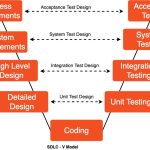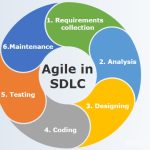The Big Bang model is an SDLC model where we do not follow any specific process. The development just starts with the required money and efforts as the input, and the output is the software developed which may or may not be as per customer requirement. This Big Bang Model does not follow a and there is very little planning required. Even the customer is not sure about what exactly he wants and the requirements are implemented on the fly without much analysis.
Usually this model is followed for small projects where the development teams are very small.
Big Bang Model ─ Design and Application
The Big Bang Model comprises of focusing all the possible resources in the software development and coding, with very little or no planning. The requirements are understood and implemented as they come. Any changes required may or may not need to revamp the complete software.
This model is ideal for small projects with one or two developers working together and is also useful for academic or practice projects. It is an ideal model for the product where requirements are not well understood and the final release date is not given.
Big Bang Model – Pros and Cons
The advantage of this Big Bang Model is that it is very simple and requires very little or no planning. Easy to manage and no formal procedure are required.
However, the Big Bang Model is a very high risk model and changes in the requirements or misunderstood requirements may even lead to complete reversal or scraping of the project. It is ideal for repetitive or small projects with minimum risks.
The advantages of the Big Bang Model are as follows −
· This is a very simple model
· Little or no planning required
· Easy to manage
· Very few resources required
· Gives flexibility to developers
· It is a good learning aid for new comers or students.
The disadvantages of the Big Bang Model are as follows −
· Very High risk and uncertainty.
· Not a good model for complex and object-oriented projects.
· Poor model for long and ongoing projects.
· Can turn out to be very expensive if requirements are misunderstood.


